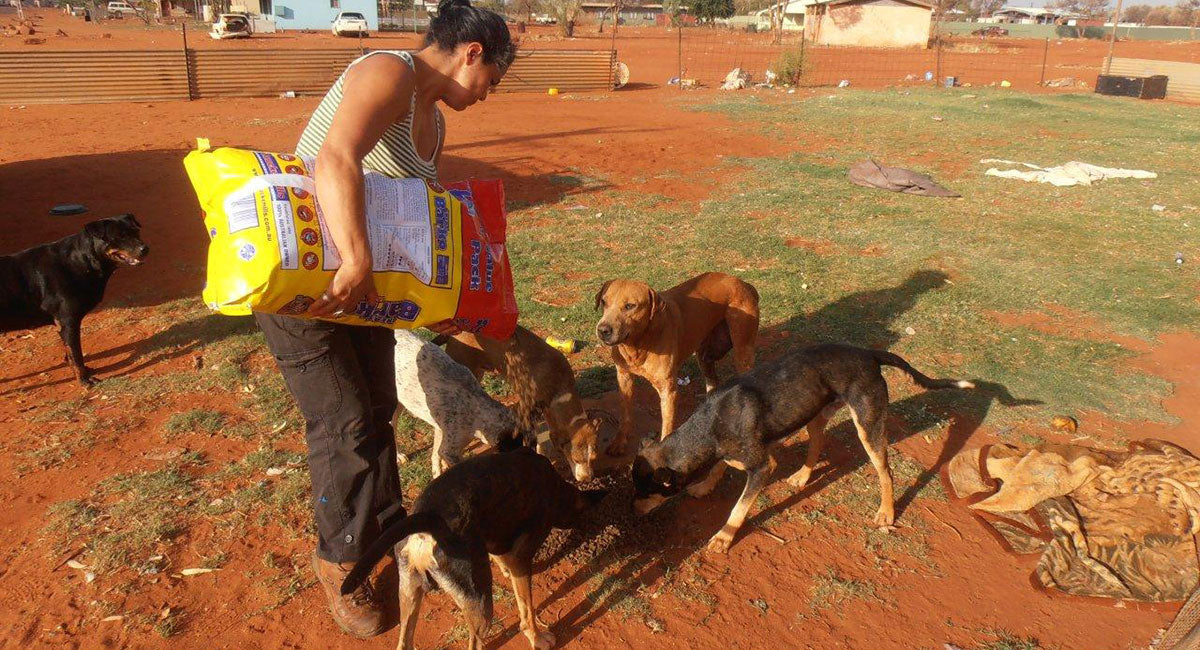The Importance of Dogs within Indigenous Culture and Communities
Dogs have always featured as an important part of Indigenous culture. Both as companions and as a part of Dreaming stories and cultural beliefs. Dogs did and still do serve a number of important roles, including physical and spiritual protector, hunter, companion and on cold winter nights an important source of warmth. Today, dogs continue to play an important role within Indigenous culture and communities.
 Dingo. Courtesy of Getty Images, 2019.
Dingo. Courtesy of Getty Images, 2019.
Traditionally, Indigenous peoples companions were dingoes. Dingoes have been on the Australian continent for thousands of years and are woven into First Nation peoples daily lives, law and culture. Dingoes form an important part of Dreaming stories and often feature as totems. As talked about in a report by the Animal Management in Rural and Remote Indigenous Communities (AMRRIC) (2013):
“There are many dog dreaming sites located around the Australian continent and each has its own and often interconnected story of creation and movement of the dingo through the country. Stories are told covering areas over thousands of kilometres and across different language groups. Ceremonies that are based around the dingo and dog continue to be practised across northern Australia with relevant songs, dances and stories being very much intact.”
As mentioned above, dingoes and dogs serve a number of different purposes. They can be seen as protectors from spiritual interference, these beliefs have continued into contemporary times. Dogs howling, barking or being silent through the nights are often interpreted in relation to the spirit world. Dogs have also always served as physical protectors of both young children and Elders. Lastly dogs were and still are prized for their hunting prowess, with many dogs being skilled at hunting kangaroos and goanna’s (AMRRIC, 2013).
 Dogs being cared for by the AMRRIC. Courtesy of AMRRIC, 2021.
Dogs being cared for by the AMRRIC. Courtesy of AMRRIC, 2021.
First Nations peoples relationship with dogs is unique it unlike any preconceived western notion of what persons relationship with an animal should be. Dogs are seen as friends and as their own entities, free to come and go as they please. In Indigenous culture dogs often have formal inclusion into family, with some even being given ‘skin’ names. This automatically positions the dingo in society, granting them a status. Some dogs are even considered important enough to attend rituals. Dogs aren’t considered as owned or as pets for both cultural and practical reasons. In times past while having the companionship of dogs was incredibly beneficial in many ways yet, having an animal that was completely reliant on you was not. Having to carry a stock of food and also the risk of the disease were the key drawbacks (ABC Radio National, 2017).
In remote Indigneous communities today these unique relationships with dogs are continued. There is also no distinction between dogs and dingoes when applying laws and beliefs. In the community of Yuendumu in Central Australia the Warlpiri people still very much have traditional relationships with the dogs within the community. The relationship is perfectly described through a quote by Doctor Stephen Cutter (Dawin based vet who frequently visits Yuendumu) in an interview with ABC Radio National (2017), he says:
"If the dog chooses to change houses, if he decides he really likes your neighbour's house, you might be a little bit sad, but it's ultimately their choice."
In Yuendumu dogs also play a key role and in protecting Elders and the community as a whole. Yuendumu resident Maidie Napurrla lives on the edge of town. When she sleeps outside her dogs chase away the horses and camels who wander into the community late at night looking for water. She says that they keep her safe (ABC Radio National, 2017).
 Feeding Dogs as a part of Warlukurlangu’s Artists Healthy Dog Program. Courtesy of Warlukurlangu Artists, 2021.
Feeding Dogs as a part of Warlukurlangu’s Artists Healthy Dog Program. Courtesy of Warlukurlangu Artists, 2021.
Since the arrival of introduced species of dogs Yuendumu and many other remote Indigenous communities have been faced with an overpopulation problem. Introduced dogs are much more fertile than dingoes and are as such giving birth to more pups at younger ages. Because these dogs are allowed to live free and independent lives this issue is increased. In Yuendumu our partner art centre Warlukurlangu Artists are working hard to make sure dogs are desexed and kept healthy, their key slogan being ‘healthy dogs means healthy people’. Their program includes feeding hungry dogs, managing ticks and caring for sick abandoned dogs. They also fund vets to visit the community to sterilise dogs and treat them for various diseases (Warlukurlangu Artists, 2021). The AMRRIC are also carrying out similar work in many different communities. Helping to regulate the numbers and dogs being born and maintain their health, as the animals are hugely important parts of their communities (AMRRIC, 2021).
 Artwork by Senita Napangardi Granites. Courtesy of Warlukurlangu Artists, 2020.
Artwork by Senita Napangardi Granites. Courtesy of Warlukurlangu Artists, 2020.
It’s been incredible learning more about the importance of dogs in Indigenous culture, the strong connections people have with the animals and how they feature as an important part of their everyday lives. If you would like to support Warlu and their Healthy Dog Program, all of the sales of their gorgeous painted dogs directly to fund the program. You can also make donations to the AMRRIC here.






